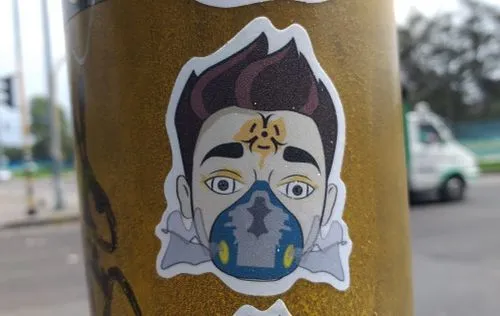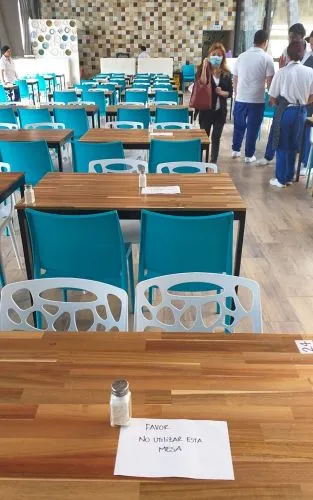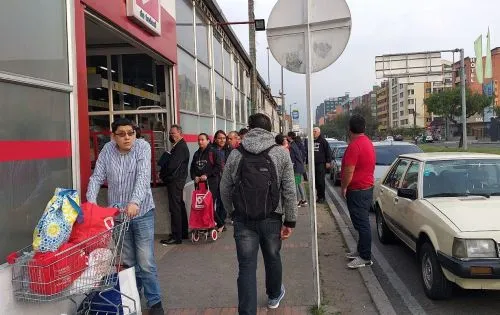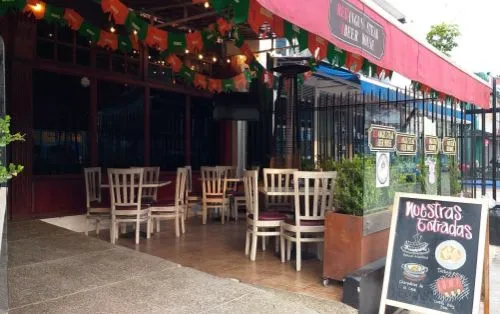Beyond the curfew: COVID-19’s impact on Colombia
April 07, 2020. Authors: Eva Youkhana, Emilia Schmidt, Alejandro Mora-Motta. All authors are researchers at the Center for Development Research (ZEF) of the University of Bonn.
Slowly but definitely, we are familiarizing with the measures taken by the German government to embank the COVID-19 pandemic. Home office, home schooling, home gym and home cooking while observing one of the most beautiful spring onsets since long – from inside our comfortable homes, in partly imposed or self-chosen quarantine. Facing different challenges due to the increase of online meetings, teaching and management assignments, us academics are coping with the restructuring of our working days. Our worries and concerns are focused on mainly elderly family members. For those living in the Global South, where the pandemic is still at its initial stage, the crisis takes different shapes. At the moment, we can just observe and make rough estimates of how the COVID-19 pandemic will impact on these countries’ political, cultural, economic and social lives.
Colombia: A traditional "hotspot" of violent conflict and social inequalities
We, a group of ZEF-researchers and doctoral studies support program (DSSP) project team members, visited our academic partners from the bilateral graduate school “Environmental Peace and Development” in Colombia at the National University and other Universities in Bogotá and Medellin. The visit was planned to last three weeks (March 6-26, 2020) and included a one-week teaching assignment for the doctoral studies program at the partner Institute for Environmental Studies (IDEA). But, after all, we had to turn over all our plans. We left Colombia on March 19, long before our planned departure and with the last flight Lufthansa from Bogotá to Frankfurt, Germany. By then, the measures taken by the Colombian government were already stricter and more far-reaching than those effective in Germany these days.

Colombian government’s response to COVID-19
On March 6, 2020 the Ministry of Health and Social Protection confirmed Colombia's first case of COVID-19 infection. From that moment on, we could observe a day-by-day approach to try to prevent an uncontrollable outbreak of the virus and collapse of the public health system. Consequently, the right-wing conservative government under President Iván Duque Márquez announced a national quarantine which was initially imposed until April 13. By April 3, Colombia reported 1,161 corona cases and 19 cases of death. Due to limited capacities to carry out large-scale testing, these numbers might not reflect the real situation. The government's factual response to the increasing number of coronavirus infections consisted of: closing schools and universities, closing of all national land, river and sea borders in addition to imposing a strict curfew, partly enforced by security forces and terms of imprisonment in case of violations in most parts of the country.
Is Colombia’s public health system prepared?
The Colombian health system is based on Law no. 100 which was issued in 1993. While access to essential health care services is considered universal under this law, health care is treated as a commodity. The mainly private companies in charge of providing health care services try to maximize profits by keeping costs and expenditures low. This implies that costs for treatment and medical personnel are kept at a minimum. The low national budget for health (in addition to an almost non-existent public health system) is a recipe for disaster in the case of a major health event. Moreover, around 65% of the labor force in the health sector is informal. And most of those who have formal working contracts are hired on a short-term basis, not as regular employees. Needless to say, the government does not provide unemployment subsidies. The COVID-19 outbreak in Colombia finds a health system that is not capable of coping with many seriously ill people simultaneously.
Curfew: a special challenge for poor people
Even if all imposed measures prevent people from getting infected and makes them stay at home, more than half of the Colombian population is working in the informal sector and depends on daily income from street sales. Only a few of them can afford the “luxury” of quarantine while living from financial reserves. At the end of 2019, just before the coronavirus world crisis started, Colombian people took to the streets to protest for significant changes. Among the many issues people demanded was a transformation of the neoliberal public health, labor and social protection systems. Currently, people cannot protest in the streets due to quarantine, but sadly, COVID-19 arrived in Colombia only to show that the protests in 2019 were justifiable. In addition, NGOs in Colombia have reported that the curfew worsens the situation of potential victims of domestic violence, especially in the bigger cities. Only a few days after the curfew had been imposed, UN Women reported that more women had been murdered and assaulted than in other comparable periods. The crisis will particularly affect the socially vulnerable and exacerbate existing structures of poverty and inequality within the country.


Neighbor Venezuela: another tragedy
The estimated 1.8 million refugees from Venezuela are especially exposed to the spread of the coronavirus. They are without any protection and at risk of becoming forgotten in this crisis. The same dramatic situation affects the population in the Colombian-Venezuelan border regions. The Colombian government has closed the country’s borders with the neighboring countries until May 30. Tens of thousands of Venezuelan citizens supplied themselves daily with food and medicine across the border. The uncertain political and economic situation, on top of the coronavirus pandemic and together with US-president Donald Trump’s announcement of a bounty of 15 Mio $ for capturing Venezuela’s president Nicolás Maduro, will aggravate the humanitarian crisis in Venezuela even more. In this precarious situation, cooperation and financial support from the international community are required more than ever.
A global look at COVID-19: The poorest are hit hardest
The current health crisis is a global one from which the poorest and most marginalized people all over the world will suffer most. The crisis bluntly reveals global issues of inequalities, as well as unequal terms of trade and asymmetric dependencies in supply and commodity chains. Future research priorities should focus more on hygienic precautions and health prevention. How can we overcome the two-tier health care system in order to protect those people who are hit the hardest? More attention should also be paid to global processes and the socio-economic implications of COVID-19 on the short, medium and long run. How can small- and medium-size enterprises, those working in the informal sectors and as low-wage laborers, especially in and from the global South, be empowered so they are less vulnerable to these unexpected but far-reaching global shocks? Neoliberal principles and the commodification of almost every part of our societies, politics, culture, religion, education and last but not least health-care systems need to be re-thought fundamentally.

We have to take up this challenge, when we have recovered from the shock-induced paralysis and can create new paths for more socio-economic equity, political participation and environmental protection.
More information available at:
https://amerika21.de/2020/03/238475/gewalt-gegen-frauen-corona-kolumbien
https://colombiareports.com/colombia-in-quarantine-easier-said-than-done-but-the-only-way-out/
https://www.ipg-journal.de/regionen/global/artikel/detail/ungleichheit-toetet-4191/
Authors: Eva Youkhana, Emilia Schmidt, Alejandro Mora-Motta. All authors are researchers at the Center for Development Research (ZEF) of the University of Bonn.
Photos by Eva Youkhana
The Doctoral Studies Support Program (DSSP) on "Environmental peace building and development in Colombia" is a bilateral program of the Center of Development Research (ZEF) at the University of Bonn and the Institute of Environmental Studies (Instituto de Estudios Ambientales – IDEA) at the Universidad Nacional de Colombia. It is financed by the German Academic Exchange Service (Deutscher Akademischer Austauschdienst – DAAD).


